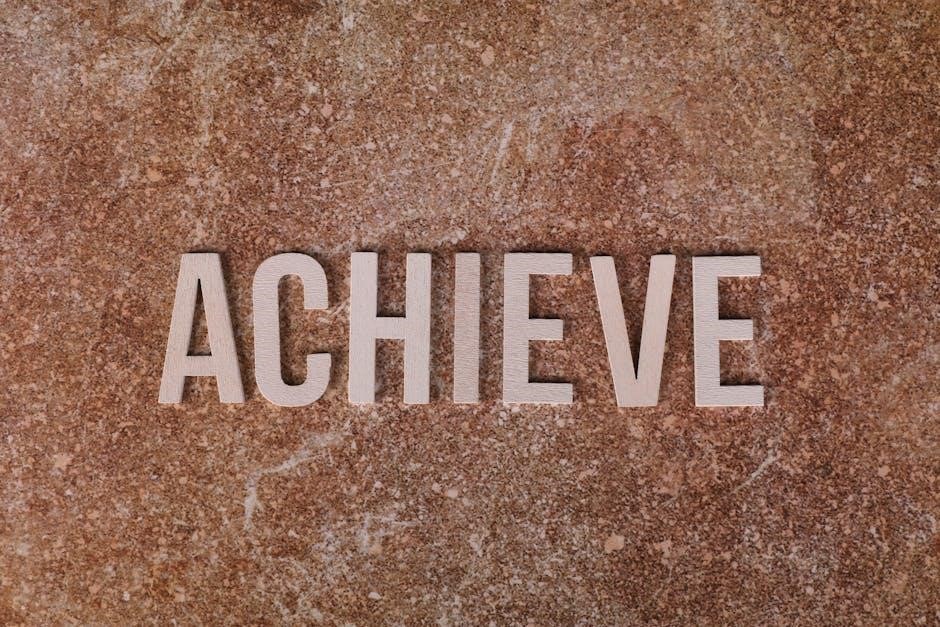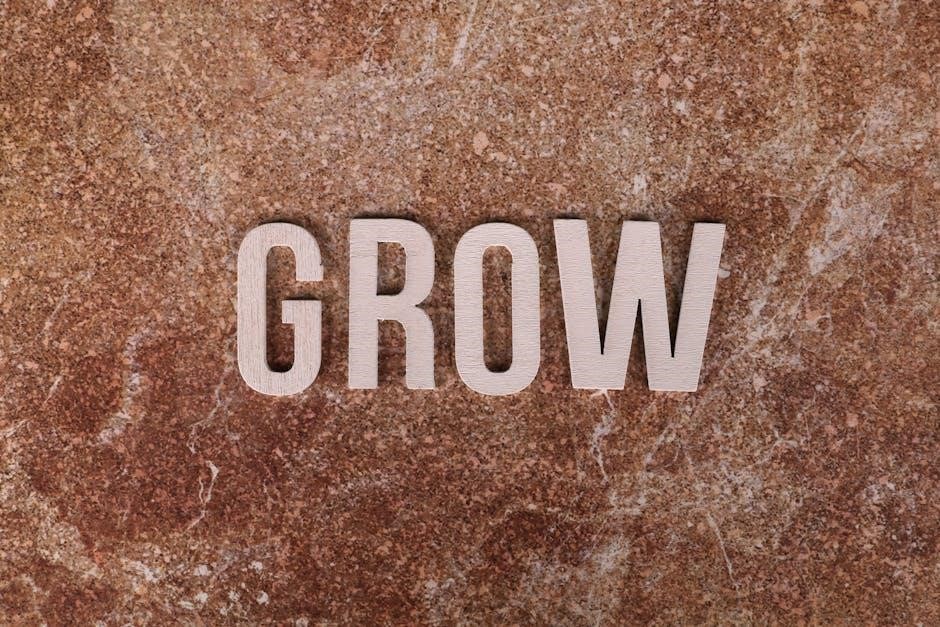Carol Dweck’s pioneering research introduces two mindsets: growth and fixed․ A growth mindset believes abilities develop through effort, while a fixed mindset sees them as innate, impacting success and development․
Definition of Growth Mindset
A growth mindset is the belief that intelligence, talents, and abilities can develop and improve through dedication, hard work, and persistent effort․ People with this mindset see challenges as opportunities for growth and learning, rather than threats to their ego․ They understand that setbacks are part of the process and view failure as a stepping stone to success․ This mindset fosters resilience, creativity, and a lifelong love for learning, empowering individuals to embrace opportunities for self-improvement and development in all areas of life․
Definition of Fixed Mindset
A fixed mindset is the belief that intelligence, talents, and abilities are innate and unchangeable․ People with this mindset view their qualities as fixed traits, resistant to development through effort․ They often avoid challenges to prevent failure, which they perceive as a threat to their ego․ Those with a fixed mindset are more likely to be discouraged by setbacks, as they see them as evidence of their limitations rather than opportunities to learn․ This mindset fosters a focus on proving oneself rather than improving, limiting personal growth and resilience in the face of obstacles․
Importance of Understanding Mindsets in Success
Understanding the distinction between growth and fixed mindsets is crucial for achieving success in various aspects of life․ A growth mindset fosters resilience, adaptability, and lifelong learning, enabling individuals to embrace challenges and view failures as opportunities for growth․ Conversely, a fixed mindset can hinder personal and professional development by discouraging risk-taking and limiting potential․ Recognizing these mindsets helps individuals and organizations cultivate environments that promote continuous improvement, innovation, and overall success․ This awareness is essential for unlocking human potential and overcoming obstacles in an ever-evolving world․
Key Differences Between Growth and Fixed Mindsets
Growth mindsets embrace challenges and persist through obstacles, believing effort leads to growth․ Fixed mindsets avoid difficulties, fearing failure may expose inadequacies, limiting personal development and success․
Approach to Challenges
Individuals with a growth mindset view challenges as opportunities for growth and learning, embracing effort and persistence to overcome obstacles․ They believe abilities can be developed through dedication and practice․ In contrast, those with a fixed mindset often avoid challenges, fearing failure may reveal their perceived limitations․ They tend to withdraw from difficult situations, as they see abilities as innate and unchangeable․ This difference in approach significantly impacts resilience, with growth mindsets fostering adaptability and fixed mindsets potentially hindering personal and professional development․
Response to Feedback
Individuals with a growth mindset view feedback as a valuable tool for improvement, embracing constructive criticism to enhance their skills and understanding․ They see feedback as a stepping stone for growth․ Conversely, those with a fixed mindset often resist or dismiss feedback, perceiving it as a personal criticism rather than an opportunity to learn․ This divergence in response highlights the growth mindset’s openness to development, while the fixed mindset’s defensiveness can hinder progress and adaptation in personal and professional settings․
View of Intelligence and Abilities
Individuals with a growth mindset believe intelligence and abilities can be cultivated through effort, learning, and persistence․ They see challenges as opportunities to develop their skills further․ In contrast, those with a fixed mindset view intelligence and talents as innate and unchangeable, believing people are either naturally gifted or not․ This fundamental difference shapes how each group approaches challenges and views their potential for growth and success in various endeavors․

Characteristics of a Growth Mindset
A growth mindset is marked by embracing challenges, persistence, and viewing effort as essential for growth․ It fosters resilience, adaptability, and a focus on continuous improvement and learning․
Embracing Effort as a Path to Improvement
Individuals with a growth mindset believe effort is a critical driver of progress․ They view challenges as opportunities to learn and grow, rather than threats to ego․ Persistence is valued, and setbacks are seen as stepping stones for improvement․ This perspective fosters resilience, as effort is embraced as a constructive process, not an avoidance tactic․ By focusing on the journey rather than just outcomes, growth-minded individuals cultivate a deeper understanding of their abilities and potential․ This mindset thrives in environments where hard work and dedication are celebrated as pathways to success․
Optimism in the Face of Setbacks
Individuals with a growth mindset exhibit optimism when confronted with setbacks, viewing them as opportunities for growth rather than insurmountable obstacles․ They believe challenges are temporary and can be overcome through persistence and learning․ This positive outlook fosters resilience, enabling them to navigate difficulties with renewed determination․ By reframing failures as stepping stones for improvement, growth-minded individuals maintain motivation and confidence in their ability to succeed․ This optimism not only enhances their problem-solving skills but also strengthens their belief in continuous development․ Embracing setbacks with hope and perseverance is a cornerstone of the growth mindset․
Focus on Learning and Development
Individuals with a growth mindset prioritize learning and development, viewing challenges as opportunities to gain new skills and knowledge․ They are driven by a desire to improve and understand that progress, not perfection, is the goal․ This mindset fosters a love for learning, encouraging individuals to seek out new experiences and persist in the face of obstacles․ By focusing on development, they cultivate resilience, adaptability, and a deeper understanding of their abilities, ultimately leading to personal and professional growth․

Characteristics of a Fixed Mindset
A fixed mindset believes abilities are innate and unchangeable, leading to avoidance of challenges, fear of failure, and prioritizing performance over growth and development․

Belief in Fixed Intelligence and Talents
Individuals with a fixed mindset believe their intelligence, talents, and abilities are innate and unchangeable․ They view success as a reflection of their inherent qualities rather than effort or learning․ This belief leads to a focus on demonstrating abilities rather than developing them․ Challenges are often avoided to prevent failure, which could undermine their self-image․ In contrast to a growth mindset, this perspective discourages persistence and limits opportunities for growth, as people assume their potential is predetermined and unalterable․ This mindset can hinder personal and professional development significantly․
Avoidance of Challenges
Those with a fixed mindset often avoid challenges to prevent failure, which they perceive as a threat to their ego and self-image․ They believe their abilities are fixed, so challenges are seen as risks rather than opportunities for growth․ This avoidance limits their potential, as they stick to tasks where they can guarantee success, rather than embracing situations that could foster learning and improvement․ By avoiding challenges, they miss out on the chance to develop new skills and adapt to new situations, hindering personal and professional development․
Pessimism Toward Effort and Outcomes
Individuals with a fixed mindset often view effort as pointless, believing that success depends on innate talents rather than hard work․ They are pessimistic about outcomes, expecting failure and setbacks, which discourages them from pursuing challenging tasks․ This mindset leads to a lack of resilience, as they are quick to give up when faced with obstacles․ Their belief that effort won’t lead to meaningful progress fosters a negative outlook on personal and professional growth, limiting their potential to adapt and succeed in dynamic environments․

Real-World Applications of Mindsets
Mindsets influence success in education, workplace, and personal relationships, shaping how individuals approach challenges, feedback, and growth opportunities, impacting overall achievement and well-being in various life domains․
Education and Learning
In education, a growth mindset fosters resilience and a love for learning, as students embrace challenges and view failures as opportunities to improve․ Educators who encourage effort over talent help students develop this mindset, leading to higher academic achievement․ Conversely, a fixed mindset can limit potential, as students avoid challenges to protect their ego․ By promoting a growth mindset, schools create an environment where perseverance and creativity thrive, empowering students to reach their full potential and enjoy the learning process․ This approach nurtures lifelong learners and problem-solvers․
Workplace and Professional Development
In the workplace, a growth mindset fosters innovation, adaptability, and continuous improvement․ Employees with this mindset view challenges as opportunities to learn and grow, driving professional development․ Organizations that promote a growth mindset encourage experimentation, resilience, and collaboration․ Leaders who embrace effort over perfection inspire teams to take risks and innovate․ Conversely, a fixed mindset can hinder career growth, as individuals may avoid challenges and resist feedback․ Cultivating a growth mindset in the workplace leads to a more motivated, resourceful, and forward-thinking workforce, ultimately benefiting both individuals and organizations․
Personal Relationships and Networking
A growth mindset enhances personal relationships by fostering empathy, openness, and resilience․ Individuals with this mindset view conflicts as opportunities for growth, leading to deeper connections․ In networking, they approach interactions with curiosity, seeking to learn and collaborate․ A fixed mindset, however, may lead to defensiveness or avoidance of social challenges, stifling relationship growth․ Cultivating a growth mindset in personal and professional networks promotes mutual understanding, trust, and shared success, enriching both personal and career-related relationships․

The Role of Effort in Mindset Development
Effort is central to mindset development, as it drives growth by proving abilities can improve through persistence and dedication, reinforcing the belief that hard work leads to progress․
How Effort Shapes Intelligence and Abilities
Effort plays a pivotal role in shaping intelligence and abilities by demonstrating that cognitive skills and talents can be enhanced through dedication and perseverance․ Individuals with a growth mindset believe that effort is a catalyst for improvement, as it strengthens neural connections in the brain․ By embracing challenges and persisting through difficulties, people can develop new skills and enhance existing ones․ This perspective, rooted in Carol Dweck’s research, highlights that intelligence is not static but can be cultivated over time with consistent effort and the right strategies․
Overcoming Fixed Mindset Through Practice
Practice is a powerful tool for transitioning from a fixed to a growth mindset․ Consistent effort helps individuals recognize that progress, not perfection, is the goal․ By engaging in deliberate practice, people build confidence in their ability to improve, challenging the belief that abilities are innate․ Over time, practice fosters resilience and problem-solving skills, encouraging a focus on learning rather than avoiding failure․ This shift enables individuals to embrace challenges as opportunities for growth, ultimately adopting a growth mindset․

Carol Dweck’s Perspective on Mindsets
Carol Dweck introduced the concept of growth and fixed mindsets, emphasizing their impact on success and development․ Her research highlights how mindsets shape behavior and outcomes․
Origins of the Mindset Concept
The mindset concept was first introduced by Carol Dweck through her groundbreaking research on motivation and human behavior․ She observed how individuals approach challenges and feedback, leading her to identify two distinct patterns: growth and fixed mindsets․ Dweck’s work revealed that these mindsets are deeply rooted in people’s beliefs about their abilities and intelligence, shaping their responses to effort and setbacks․
When Fixed Mindset Might Be Preferable
While the growth mindset is often praised, there are scenarios where a fixed mindset might be advantageous․ For instance, in high-stakes situations requiring quick decisions, a fixed mindset can provide clarity and confidence based on existing skills․ It can also prevent overanalysis in routine tasks, where innovation isn’t necessary․ However, relying solely on a fixed mindset can hinder growth in dynamic or creative fields․ Carol Dweck acknowledges that balance is key, as neither mindset is universally superior in all contexts․

Implications of Fixed Mindset in Modern Society
A fixed mindset can hinder innovation, limit personal growth, and reduce adaptability in a rapidly changing world, affecting workplace dynamics and educational progress negatively․
Limitations in Personal Growth
A fixed mindset imposes significant barriers to personal growth by discouraging individuals from pursuing challenges and viewing effort as pointless․ This rigid belief system leads to a fear of failure, as it is perceived as a reflection of one’s inherent limitations rather than an opportunity to learn․ Over time, this mindset stifles creativity, hinders skill development, and fosters a lack of resilience, ultimately preventing individuals from reaching their full potential in both personal and professional realms․
Impact on Team Collaboration and Innovation
A fixed mindset can severely hinder team collaboration and innovation by fostering a culture of fear and competition․ Individuals with this mindset often avoid sharing ideas or taking risks, fearing criticism or exposure of their perceived limitations․ This stifles creativity and prevents teams from capitalizing on diverse perspectives․ In contrast, a growth mindset encourages open communication, mutual learning, and experimentation, leading to more innovative solutions and stronger team cohesion․ Organizations with a fixed mindset struggle to adapt and innovate in dynamic environments, ultimately falling behind in competitive landscapes․

How to Promote a Growth Mindset
Promote a growth mindset by praising effort, embracing challenges, and viewing failures as learning opportunities․ Foster curiosity, provide constructive feedback, and encourage persistence and resilience․
Strategies for Individuals
Individuals can cultivate a growth mindset by setting learning goals, practicing self-reflection, and embracing challenges․ Engage in lifelong learning, seek feedback, and view failures as growth opportunities․ Celebrate progress, no matter how small, and surround yourself with supportive individuals who encourage effort and persistence․ Develop a curiosity-driven mindset by asking questions and exploring new interests․ Lastly, practice mindfulness to stay present and focused on development, fostering resilience and adaptability in the face of obstacles․
Strategies for Organizations
Organizations can foster a growth mindset by promoting a culture of continuous learning and development․ Provide training programs that emphasize skill-building and resilience․ Encourage open communication where employees feel safe sharing ideas and receiving feedback․ Recognize and reward effort, not just results, to reinforce the value of persistence․ Lead by example, with leaders demonstrating a growth mindset themselves․ Create opportunities for collaboration and innovation, allowing employees to take calculated risks and learn from outcomes․ This collective approach drives organizational growth and adaptability in an ever-changing environment․
Embracing a growth mindset fosters resilience, innovation, and lifelong learning․ By nurturing effort and perseverance, individuals and organizations can unlock their full potential and thrive in challenges․
Final Thoughts on the Importance of Mindsets
Mindsets profoundly shape how individuals approach life, influencing personal and professional growth․ A growth mindset cultivates resilience, creativity, and continuous improvement, while a fixed mindset often limits potential․ Understanding these concepts empowers people to embrace challenges, persist through setbacks, and unlock their true capabilities․ By fostering a growth mindset, individuals can achieve greater fulfillment and success in both personal and professional realms, ultimately leading to a more purposeful and impactful life․
Call to Action for Adopting a Growth Mindset
Embrace the power of a growth mindset by taking small, consistent steps to reframe your thoughts and actions․ View challenges as opportunities for growth, persist through obstacles, and learn from feedback․ Recognize that intelligence and abilities can evolve with effort and dedication․ Start today by setting goals, practicing self-reflection, and celebrating progress․ By choosing a growth mindset, you unlock the potential to achieve greater success and fulfillment in all areas of life․
